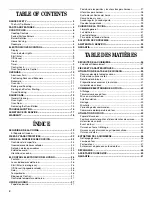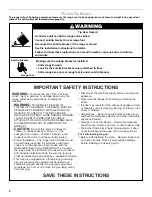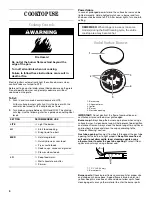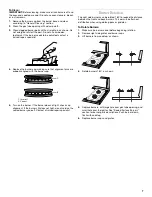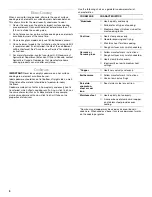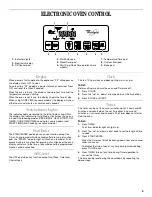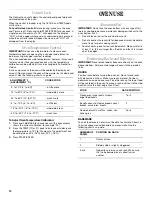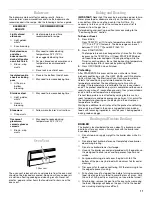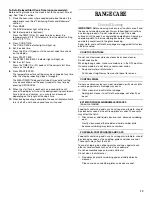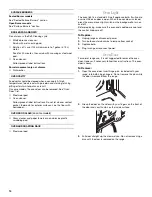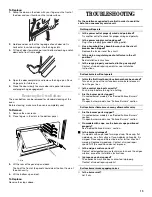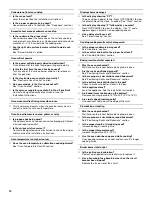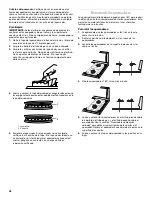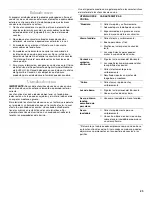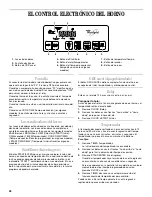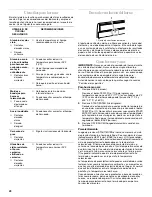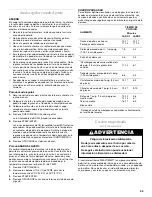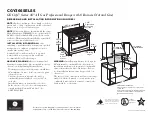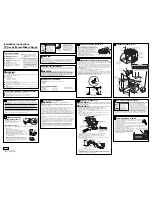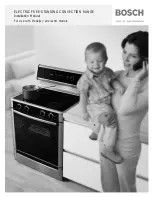
15
To Replace:
1.
Grasp the door on the sides with your fingers on the front of
the door and your thumbs on the inside surface.
2.
Hold oven door so that the top edge of each door slot is
horizontal. Insert door hinge into the hinge slots.
3.
Tilt top of door toward range. Insert bottom door hinge notch
down onto front frame edge.
4.
Open the door completely and remove the hinge pins. Save
hinge pins for future use.
5.
Close the door slowly to assure door side panel clearance
and proper hinge engagement.
Removing the Oven Bottom
The oven bottom can be removed for standard cleaning of the
oven.
Before cleaning, make sure the oven is completely cool.
To Remove:
1.
Remove the oven racks.
2.
Place fingers in the slots in the bottom panel.
1. Lip
3.
Lift the rear of the panel up and back.
The lip at the front of the panel should clear the front frame of
the oven cavity.
4.
Lift the bottom up and out.
To Replace:
Reverse the steps above.
TROUBLESHOOTING
Try the solutions suggested here first in order to avoid the
cost of an unnecessary service call.
Nothing will operate
■
Is the power outlet properly wired and polarized?
Try another outlet to check for proper wiring and polarity.
■
Is the power supply cord unplugged?
Plug into a properly grounded 3 prong outlet.
■
Has a household fuse been blown or has the circuit
breaker been tripped?
Replace the fuse or reset the circuit.
■
Is the main or regulator gas shutoff valve in the off
position?
See Installation Instructions.
■
Is the range properly connected to the gas supply?
Contact a trained repair specialist or see Installation
Instructions.
Surface burners will not operate
■
Is this the first time the surface burners have been used?
Turn on any one of the surface burner knobs to release air
from the gas lines.
■
Is the control knob set correctly?
Push in knob before turning to a setting.
■
Are the burner ports clogged?
On sealed burner models, see “Sealed Surface Burners”
section.
On open burner models, see “Surface Burners” section.
Surface burner flames are uneven, yellow and/or noisy
■
Are the burner ports clogged?
On sealed burner models, see “Sealed Surface Burners”
section.
On open burner models, see “Surface Burners” section.
■
On models with caps, are the burner caps positioned
properly?
See “Sealed Surface Burners” section.
■
Is the burner damaged?
On models with caps, look for warped cap. Place cap, flat
side-down, on a flat surface. If cap wobbles noticeably, it is
warped. Place cap on different burner for further check of
warping. Replace warped cap. Contact a trained repair
specialist if the condition does not improve.
■
Is the air/gas mixture correct?
Contact a designated service technician to check the air/gas
mixture, or see the Installation Instructions.
■
Is propane gas being used?
The appliance may have been converted improperly.
Contact a trained repair specialist.
Surface burner makes popping noises
■
Is the burner wet?
Let it dry.


